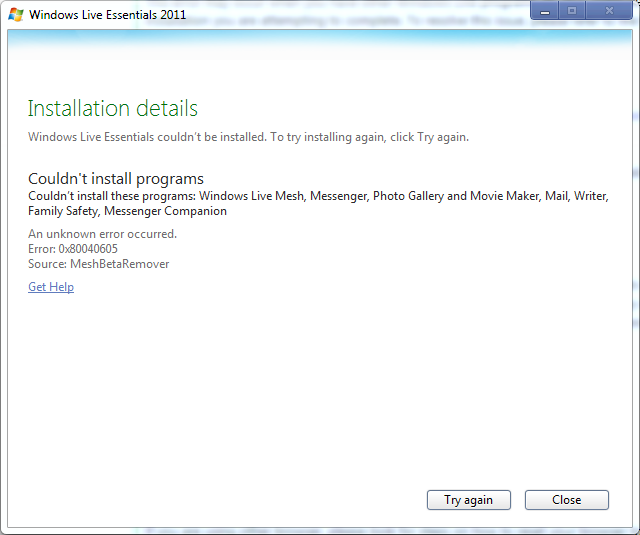I stumbled upon a nice post from SEOmoz that outlines how to do this.
Thankfully, there’s also a really nice WordPress Plugin that will make a Google News Sitemap for you.
I stumbled upon a nice post from SEOmoz that outlines how to do this.
Thankfully, there’s also a really nice WordPress Plugin that will make a Google News Sitemap for you.
Up until l a week or two ago, if you enabled HTTPS in your Windows Live Hotmail account, you could not access your email through the Windows Live desktop client. This was a major security flaw, that Microsoft didn’t solve for a long time.
Thankfully, the latest version of Windows Live Mail finally will work with email accounts that have HTTPS permanently enabled via the web.
However, when I tried to download the latest version [link], the installer would give me the following error message.

I tried MANY different Windows Support threads on how to fix this and other Windows Live installation error, but found the only way to get rid of this error and solve the problem completely was to do the following:
While this worked for me, deleting these folders may have other consequences on other Windows Live Applications – delete those folders at your own risk with caution. If nothing else, just rename them so if you want you can change the name back to restore them like they were before.
We’re at a point in society when anything we say online could be used against us in the future, even if it’s just a joke, a tweet taken out of context, or an opinion that someone else finds offensive. Today’s society in the US has become hyper-sensitive about everything, to the point that in order to be deemed “politically correct” by society, one must actively sensor what they say in order not to offend anyone.
Enter into the picture: Facebook Comments, where in order to post a public comment on a public website, you now have to tie your real-life identity to a comment on a blog post that can be seen and looked up by anyone on the internet.
Not only is this a scary concept due to the lack of personal privacy, but it’s also detrimental to the authenticity of posts. If your comment is posting to your Facebook friend feed (as well as the internet) under your name, you’re going to speak differently than if your list of friends and family could not see your comment.
A great post by Steve Cheney makes a few good points:
This latest push by Facebook to tie people to one identity across the interwebs is very troublesome.The problem with tying internet-wide identity to a broadcast network like Facebook is that people don’t want one normalized identity, either in real life, or virtually.
People yearn to be individuals. They want to be authentic. They have numerous different groups of real-life friends.
Face it, authenticity goes way down when people know their 700 friends, grandma, and 5 ex-girlfriends are tuning in each time they post something on the web.
My main contention is that the off-network spread of Facebook’s identity graph is parasitic for the web. Now – just to join the best technology community on the internet (TechCrunch) – we need to live inside Facebook walls.
I agree, and would even argue further than Steve does, that anonymity is a great tool to have. Companies have known for years that the only way to get honest feedback is to make it anonymous. Without anonymity, your feedback is going to be watered down for fear of reprimand, or buttered-up in order to suck up to someone.
Forcing your name to be tied to your online comments can help prove you’re the person saying it; but often times proof of identity isn’t needed; and in the case where it’s FORCED, such as Facebook comments, it’s harmful for the internet and society.